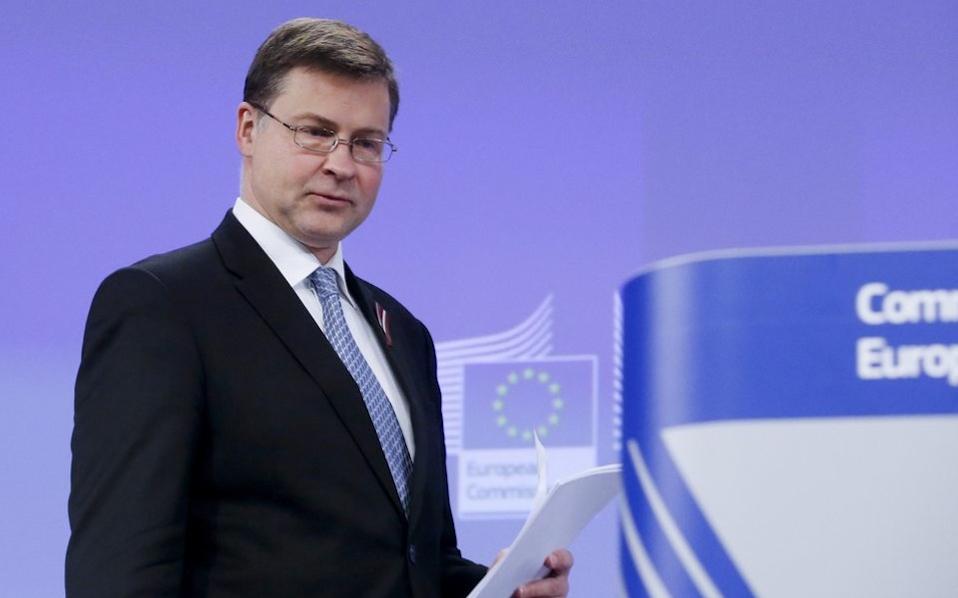EU Commission concerned about Greek business environment, says Dombrovskis

The man responsible for the euro and overseeing the Greek bailout program, European Commission Vice President Valdis Dombrovskis, gave his first interview of the New Year to Kathimerini and journalists from another four European newspapers in Brussels this week.
As prime minister of his native Latvia, Dombrovskis was responsible for one of the toughest fiscal adjustment programs in the eurozone, pulling the country out of the crisis and making it one of the bloc’s fastest-growing economies.
Dombrovskis spoke to Kathimerini about Greece’s pending bailout review, the role of the International Monetary Fund (IMF) and whether a Grexit is still on the table.
A number of officials have said that the IMF should be part of the review. Could it continue in a consulting/technical role, or would it have to put actual money on the table?
This is for creditors and other euro area countries to decide. From the EC’s point of view, we are working with the assumption that the IMF will continue fully with the program and financing. It is now closely involved in discussions in regards of policy and conditionality.
The IMF says that in order to participate in the review it needs to see debt relief, while member states say that without IMF participation they cannot close the review and then talk about debt sustainability.
This is something we are going to debate in the first review. Indeed, there is a sequencing issue, as the IMF is expecting debt sustainability before it agrees to participate in the program and eurozone members say that they will address debt sustainability after the completion of the first review. I would say that if there is clear progress in terms of the program implementation and we also see a clear path towards the completion of the first review with Greek authorities having implemented the agreed conditionality, this problem of sequencing could be agreed. I see, instead, a technical problem but do not expect it to evolve in a major political problem.
You worked with European Stability Mechanism (ESM) Director Klaus Regling over the summer to develop the counter-argument on debt sustainability vis-a-vis the IMF, the different timelines and the debt servicing costs per year, etc. Have these issues been settled?
Of course IMF the makes debt sustainability a prerequisite for its participation and at the end of the day it will be an IMF board decision; they will need to see what kind of measures are being considered. But in general they are ready to use our analysis of debt servicing costs. One thing is the debt-to-GDP ratio, which they concluded is too high but when you look at the actual debt servicing costs, given the grace periods, given the very low interest rates of official debt, those debt servicing costs are more manageable, lower than for Italy or Portugal. This is something that the IMF has accepted as a point to look at in the debt sustainability issue. Of course, at the end of the day, the final say will be with the creditors and other euro area countries
All these efforts are geared partly towards Greece tapping the markets and attracting investments. A major investor pulled out earlier this week – a gold mine in northern Greece – after the company cited communication problems with the government. Do you question how Greece will progress when the government doesn’t appear very friendly towards investments?
I must admit that there are certain concerns regarding the business environment in Greece. If the Greek economy is to recover, the first condition is financial stability and important steps are being taken towards this, including bank securitization. Now, if the program is on track and we have a successful first review, this will be a large step towards restoration of financial stability in Greece. But there also needs to be a predictable business environment. For the economy to recover Greece needs investment – domestic and international – and this is something we need to pay attention to. It has to be very clear to the Greek authorities that they need to foster investment.
Are you planning any action on this front?
We do not interfere in concrete cases but in any case this is part of broader considerations when we look at economic forecasts, when how an economy will recover, and the business environment is certainly part of these considerations.
Greece doesn’t have any immediate payments in the coming months and officials have said that the review could last months rather than weeks. What do you see as a possible deadline and what would the implications be if negotiations drag on?
We are ready and willing to start the review as soon as possible, probably next week, but we are not attaching any deadline to when the review should be finalized. The priority for us is whether conditions of the first review are being met. I mentioned elements that could be important. We are very willing to move ahead with the review as quickly as possible but cannot move faster than the Greek authorities. If preconditions are not met, we will have nothing to present to the member states.
Is Grexit or a time-out off the table? Have we passed that point?
I would say so. I would definitely hope that at least no one is debating it anymore. The first program review is very important – a kind of credibility test for the Greek government vis-a-vis the other eurozone countries – because successfully completing the review will show that Greece is serious about its commitments and the program is on track. This will be a very important step towards recovering stability in Greece.





